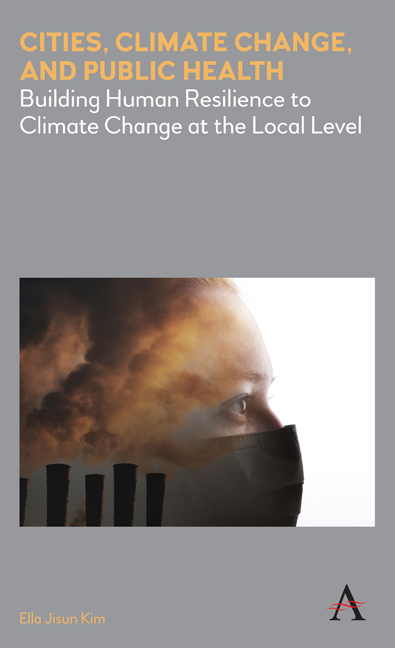 Cities, Climate Change, and Public Health
Cities, Climate Change, and Public Health Book contents
- Frontmatter
- Dedication
- Contents
- List of Figures and Tables
- Acknowledgments
- Chapter 1 Introduction
- Chapter 2 Cities, Climate Change, and Public Health
- Chapter 3 Collective Climate Adaptation at the Local Level
- Chapter 4 Framing Climate Change as a Public Health Issue
- Chapter 5 Role-Play Simulations
- Chapter 6 Digital Games
- Chapter 7 Role-Play Simulations versus Digital Games
- Chapter 8 Discussion and Policy Recommendations
- Appendix A Issue Framing Vignettes
- Appendix B Issue Framing Survey Questions
- Appendix C Role-Play Simulation Before-Survey Questions
- Appendix D Role-Play Simulation After-Survey Questions
- Appendix E Role-Play Simulation Facilitator Questionnaire
- Appendix F Role-Play Simulation Debriefing Script
- Appendix G Role-Play Simulation Post-Game Interview Questions
- Appendix H Role-Play Simulation Workshop Sample Characteristics
- Appendix I Digital Game Before-Survey Questions
- Appendix J Digital Game After-Survey Questions
- Appendix K Digital Game Post-Game Interview Questions
- Appendix L Digital Game Sample Characteristics
- References
- Index
Chapter 7 - Role-Play Simulations versus Digital Games
Published online by Cambridge University Press: 06 May 2020
- Frontmatter
- Dedication
- Contents
- List of Figures and Tables
- Acknowledgments
- Chapter 1 Introduction
- Chapter 2 Cities, Climate Change, and Public Health
- Chapter 3 Collective Climate Adaptation at the Local Level
- Chapter 4 Framing Climate Change as a Public Health Issue
- Chapter 5 Role-Play Simulations
- Chapter 6 Digital Games
- Chapter 7 Role-Play Simulations versus Digital Games
- Chapter 8 Discussion and Policy Recommendations
- Appendix A Issue Framing Vignettes
- Appendix B Issue Framing Survey Questions
- Appendix C Role-Play Simulation Before-Survey Questions
- Appendix D Role-Play Simulation After-Survey Questions
- Appendix E Role-Play Simulation Facilitator Questionnaire
- Appendix F Role-Play Simulation Debriefing Script
- Appendix G Role-Play Simulation Post-Game Interview Questions
- Appendix H Role-Play Simulation Workshop Sample Characteristics
- Appendix I Digital Game Before-Survey Questions
- Appendix J Digital Game After-Survey Questions
- Appendix K Digital Game Post-Game Interview Questions
- Appendix L Digital Game Sample Characteristics
- References
- Index
Summary
This chapter juxtaposes the results of the face-to-face role-play simulation (Chapter 5) and the digital game (Chapter 6) to compare the two serious games and their impacts on climate adaptation planning and policymaking processes at the local level.
Demographics
As seen in Table 7.1, the role-play simulation and digital game sample demographics are fairly similar. The role-play simulation sample has a more balanced gender breakdown and is slightly younger in age. However, the digital game reached a broader audience in terms of political viewpoints, with a bigger share of political conservatives and moderates. In addition, the digital game sample is more balanced in terms of household income. Both samples are similarly well educated and work in similar industries.
Attitudinal Changes
While both the face-to-face role-play simulation and the digital game were associated with increases in perceived knowledge of climate change and concern for local climate risks, the face-to-face role-play simulation effected larger shifts in its participants (knowledge of climate change: 0.073 vs. 0.049; concern for local climate risks: 0.259 vs. 0.175). The results are presented in Table 7.2.
Attitudinal changes by political viewpoint
More importantly, there were profound differences in the two games’ outcomes across the political spectrum. The face-to-face role-play simulation had the largest effects in bolstering one's perceived knowledge of climate change in political conservatives compared to moderates or liberals. Similarly, the role-play simulation effected a bigger change in amplifying one's concern for local climate risks in political conservatives than in moderates. The relevant numbers are presented in Table 7.3 (numbers underlined). The significance of the face-to-face role-play simulation effecting shifts in the thoughts, feelings, and behavioral intentions of not only moderates and liberals but also, and especially, conservatives cannot be overstated.
In contrast, the digital game had no effect in increasing perceived knowledge of climate change, concern for local climate risks, or willingness to pay higher taxes for climate adaptation in political conservatives. In political moderates, the digital game led to an increase in willingness to pay higher taxes. In other words, the shifts in these factors from playing the digital game primarily took place among liberal participants.
- Type
- Chapter
- Information
- Cities, Climate Change, and Public HealthBuilding Human Resilience to Climate Change at the Local Level, pp. 65 - 72Publisher: Anthem PressPrint publication year: 2020


